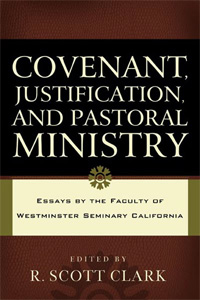I’m not a Luddite. I bought my first computer, an Atari ST, in 1985. I began using email (CompuServe) before the internet was made available to the public. It was very exciting when CompuServe and AOL users could email to each other. At . . . Continue reading →
Search results for “federal vision”
Always Abusing Semper Reformanda
The Reformation churches have some wonderful slogans that are chock full of important truths. Sometimes, however, these slogans can be misconstrued, misreported, and misunderstood. With the possible exception of sola Scriptura (by Scripture alone), none of these slogans has been mangled more . . . Continue reading →
Heidelberg 37: What Do We Mean By “Suffered”?
An internet search for “suffering” turns up an astonishing array of results. Because of the internet we are now aware of global suffering in a way, with an immediacy that no other generation has ever experienced. Despite our increased awareness, history tells . . . Continue reading →
Justification By Faith Alone Is Presbyterian Doctrine
It’s hard to remember where I last saw an actual shell game. It might have been at the Nebraska State Fair or it might have been at some amusement park. It doesn’t matter. The fellow behind the table shows you three empty . . . Continue reading →
Justification By Faith Alone Is The Normative Reformed Doctrine
Way back in 2009, when the Federal Vision controversy was still going the claim was made by a proponent of the Federal Vision that there is not a single, agreed doctrine of justification by grace alone, through faith alone but rather there . . . Continue reading →
Heidelberg 31 And 32: He Is The Savior And We Are The Saved
Introduction I first encountered the Reformed theology, piety, and practice (c. 1980) in St John’s Reformed Church, in Lincoln, Neb. There were a couple of fairly recent seminary graduates, who had both studied at the Reformed Episcopal seminary in Philadelphia in the . . . Continue reading →
Heidelberg 29: No Other Name
Jesus is an intentionally troublesome figure. He said “I am the way and the truth and the life. No one comes to the Father except through me” (John 14:6). This was an outrageous claim when it made it and remains so today. . . . Continue reading →
Does Baptism Save?
Merrit asks this question. “Two friends and I have been talking about this verse (1 Peter 3:21) and passage for quite some time today. The more we seem to talk about it the more confused I seem to get about it.” Merritt, . . . Continue reading →
Yes There Is A Reformed Doctrine Of Justification
Recently I responded to John Armstrong’s post on the TIME magazine new Calvinist discussion. In his reply, John makes this startling claim: There is no monolithic Reformed voice on justification (especially re: imputation) and I would be very happy if we allowed a . . . Continue reading →
Notes From URCNA Synod Visalia 2014
Reporting from URCNA Synod in Visalia, California. In Reformed church government there are four deliberative bodies that make decisions, a consistory (ruling elders and ministers of a local congregation), a council (ruling elders, ministers, and deacons of a local congregation), classis (a . . . Continue reading →
Faith Alone Is The Instrument Of Justification AND Salvation
Controversy can be ugly and painful and the recent controversy over sanctification has been both at times. It can also be helpful by bringing greater clarity and this controversy has been useful in that respect. Some orthodox Reformed pastors are being charged . . . Continue reading →
The Nine Points of Synod Schereville
In light of the current discussion, it seems appropriate to re-post these brief points with some explanatory resources below. We are rehashing some of the same issues, particularly points 7–9. These points were adopted as “pastoral advice” to the churches by the . . . Continue reading →
Puritans Opposed Richard Baxter
“Just searched “federal vision” at meet the Puritans.com and there are no returns. Puritans have everything to say re Tullian and nothing to say re FV” —Mihai Corcea on Twitter.
Greg Looked Behind The Curtain: You Should Too
I’m not so sure the FV folk haven’t maintained unity between Moscow and Birmingham. The connections are still there….. So who is the Davenant Trust? Of the five board members two (Rick and Bradford (M.A., New Saint Andrews College) Littlejohn, father and . . . Continue reading →
Boom! Canons Of Dort Day
This year marks the 395th anniversary of the publication of the Canons of the Synod of Dort. They were published on May 9, 1619. Canons are synodical rulings on a series of doctrinal issues and the synod published these decisions in response to . . . Continue reading →
Progress Or Regress?
So, since our 1973 founding, the PCA has “progressed” from “committed without reservation” to our Standards, to a “good faith subscription” approach that has opened the PCA’s door to paedocommunion, intinction, female pseudo-officers, Federal Vision, theistic evolution (e.g., Biologos), et al, all . . . Continue reading →
Office Hours: Mike Horton On Sanctification And The Means Of Grace (2)
If Christians have often been tempted to mysticism (the quest to meet God without instruments, media, or means) they have also been tempted to magic, tempted to turn the sacraments into things they are not. The medieval Western church taught and the . . . Continue reading →
You Might Be An Antinomian (Or Maybe Not)
Intermittently over the last 30 years we’ve been discussing justification. It began when Norman Shepherd, who taught at Westminster Theological Seminary in Philadelphia, proposed in class that sinners are justified through faith and works. He used that language. He used it in a . . . Continue reading →
Basement Tapes: The Covenant Radio Interview
Digging through an old hard drive, looking for another file, I stumbled across an interview I thought was lost, the Covenant Radio interview with William Hill on the Federal Vision and Recovering the Reformed Confession. Here’s the interview:
PT730 Studies In Distintives And Issues In The United Reformed Churches In North America (URCNA)
A directed study intended to supplement the existing preparation of URCNA students studying for the pastoral ministry and to focus their preparation for classical examinations. Prerequisite (may be taken simultaneously): HT/ST615 Reformed Confessions. 1 credit (without a term paper) or 2 Credits . . . Continue reading →














